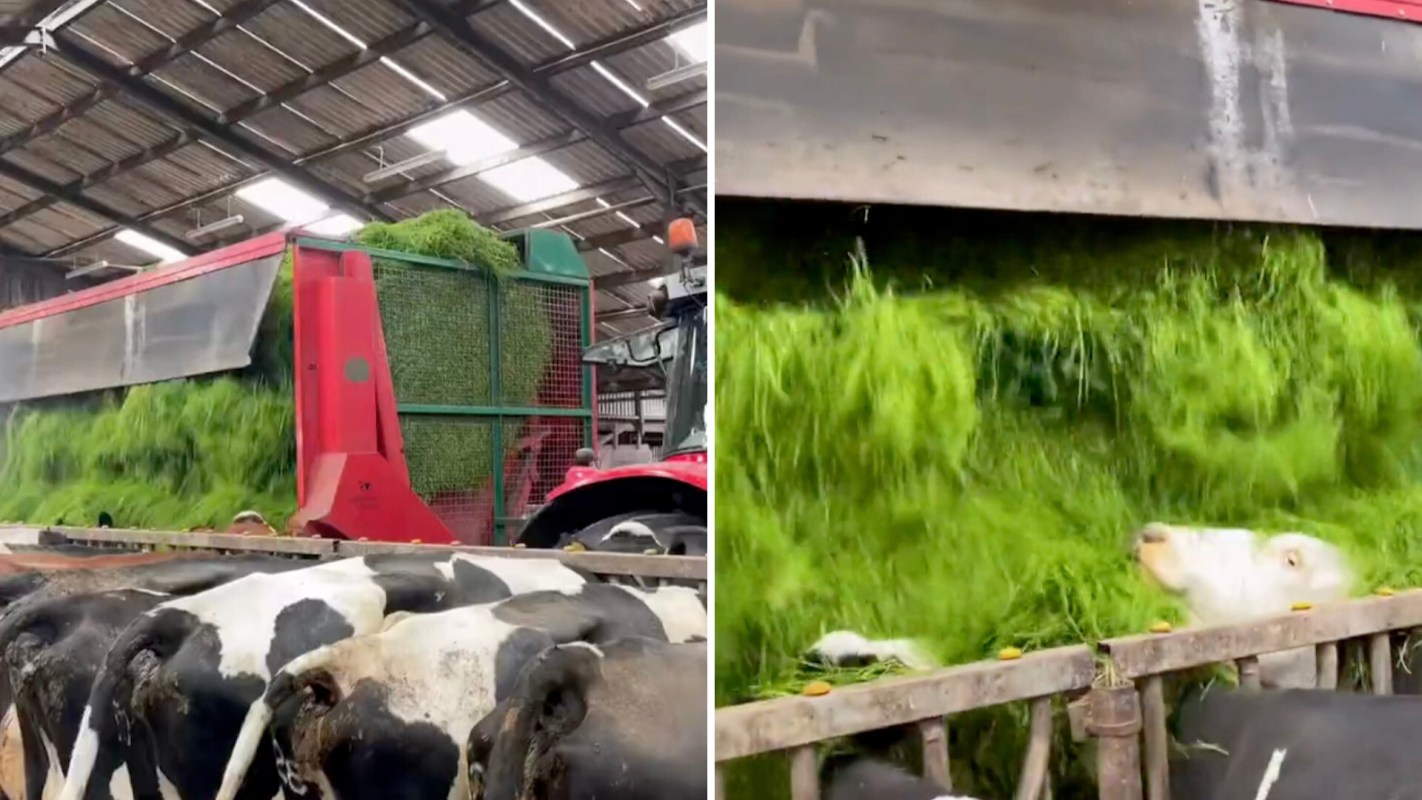The meat and dairy industries love to use terms like "farm-raised," "organic," and "grass-fed." Unfortunately, most of these labels can be used to give the illusion of a healthy, ethical product.
Veganella (@veganella_) has caused a stir on X, formerly known as Twitter, with footage from inside of a cattle farm that, she says, "puts a bit of a spanner in the works for the crop death argument."
Grass-fed cows though.
— Veganella 🥦 (@Veganella_) November 18, 2023
Puts a bit of a spanner in the works for the crop death argument too. #Vegan #GoVegan #AnimalRights pic.twitter.com/EMTEFVoPA9
The video, which appears to originate from the British publication Farmers Weekly in June, shows cows crammed together as a machine dumps a waterfall of grass over their heads. Not exactly the free-grazing, fresh green-acre life these farms want us to believe.
"Normally when we talk about crop deaths [unintended killings of animals hidden in crops during harvest], non-vegans state that they only eat grass-fed animals. The implication being that the crop deaths come from the process of harvesting grain and other feed, and since they eat grass-fed grazing animals there are none. But this demonstrates that grass-fed doesn't mean there is no harvesting," Veganella explains.
While this particular video may show dairy cows, the point Veganella is trying to make is that the "grass-fed" label does not necessarily mean the cows in question are freely grazing around eating grass on picturesque pastures. This doesn't mean all meat or dairy labeled as "grass-fed" is not living up to the standard it implies, of course, and many buyers may still be purely focused on wanting grass-fed for nutrition only and thus not care about the possibility of confined conditions. But essentially the term "grass-fed" is up for interpretation, and buyers are paying the price.
In 2016, the U.S. Agricultural Marketing Service dropped its official definition of "grass-fed." The AMS claimed that it does not have the authority to define and determine grass-fed claims on packaging to be "truthful and not misleading," as explained in a post on the USDA website.
Concentrated animal feeding operations are as massive as they are a problem for the planet. These industrial-sized livestock operations produce over 168 gases from waste, including hazardous chemicals, according to the Sierra Club. They're unnatural environmental disasters.
In April of this year, the deadliest barn fire for cattle — as NewsChannel 10 in Texas reported — killed at least 18,000 cattle living on South Fork Dairy Farm in Texas. That's enough cows to fill 26 football fields, per USA Today. It is believed the conditions of the farm not only caused the fire but facilitated many deaths.
Animal agriculture contributes to deforestation — 41% of deforestation globally, just from beef production, per Our World in Data — as well as air pollution, water pollution, and a decline in biodiversity. It produces 65% of the world's nitrous oxide pollution, which has a planet-warming impact 296 times greater than carbon dioxide, according to the University of Colorado Boulder.
According to a recent UCLA publication, eating plant-based meals just one day per week would have a drastic environmental impact. Even if just the biggest meat eaters in the UK switched to low-meat diets, it would be equivalent to eight million cars being taken off the road, per the BBC.
The American Heart Association states that eating less meat lowers the risk of heart disease, stroke, and certain cancers.
"Grass don't grow in winter," one user commented on the X post, suggesting the video cannot be waved away by saying the only reason for the indoor feeding is the season, though it is certainly possible to have it shipped in while remaining green. That transportation process, of course, would come with its own environmental detriments.
Another agreed, saying, "'Grass fed' is superb marketing."
Join our free newsletter for cool news and actionable info that makes it easy to help yourself while helping the planet.









